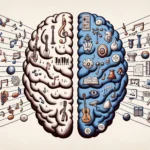The Intersection of Music Training and Intelligence: A Symphony of Cognitive Benefits
The correlation between music training and intelligence has been a topic of interest among educators, psychologists, and neuroscientists for decades. As parents and educators seek out activities that will provide the best developmental advantages for their children, the question arises: how does music training affect IQ?
Music training is more than just learning to play an instrument or read notes; it is a complex process that involves the development of various cognitive skills, including memory, attention, and problem-solving. Research studies have delved into the influence of music on the brain’s architecture and functionality, revealing fascinating insights into how music training can shape intelligence.
Several longitudinal studies have shown that children who receive consistent music training display improved IQ scores over time. This improvement in intelligence quotient is not just a temporary boost but appears to have lasting effects on various domains of cognitive function. The areas of the brain responsible for auditory processing, language development, and executive functioning exhibit enhanced activity and structural changes following musical instruction.
One of the mechanisms behind this intellectual augmentation is the enhancement of working memory. Musicians often need to hold multiple pieces of information in mind while performing, thereby exercising and expanding their working memory capacity. This improvement in working memory has been found to correlate with better performance on tasks that measure intelligence.
Furthermore, music training promotes better concentration and attention. Learning to play an instrument requires focus and the ability to filter out distractions, skills that are transferable to other academic pursuits. Through consistent practice, musicians become adept at sustaining attention for longer periods, which is an essential skill for learning and intellectual development.
Music training also fosters improved problem-solving abilities. Musicians must often interpret complex scores, translate them into hand movements and auditory output, and make real-time corrections. This demands strong analytical skills and the capacity to think creatively in order to innovate and overcome musical challenges.
In addition to its cognitive benefits, music training can positively influence emotional intelligence. The process of collaborating with other musicians to create harmonious performances can enhance social awareness and empathy. Musicians learn to understand emotional cues in music, which can translate into a better understanding of the emotions of others.
Despite the growing body of evidence supporting the link between music training and increased IQ, it is essential to note that music isn’t a magic solution for boosting intelligence. The relationship between music and IQ is likely influenced by a variety of factors, including the individual’s engagement level, the quality of instruction, and the amount of practice dedicated to the craft.
In conclusion, the impact of music training on IQ is multifaceted, affording children and adults alike a bevy of cognitive advantages. While music might not be the only path to enhanced intellectual prowess, its role in cognitive development is undeniable, and its practice should be encouraged for anyone interested in cultivating a sharper, more responsive brain. As the evidence continues to mount, one thing becomes clear: music training orchestrates a powerful symphony of cognitive benefits that can resonate throughout a lifetime.

